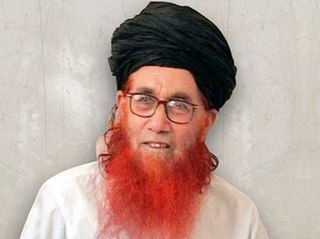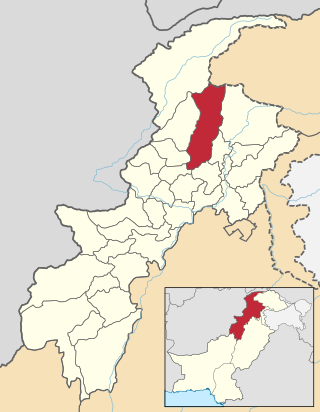
Jamaat-e-Islami, or Jamaat as it is commonly known, is an Islamist political party based in Pakistan and founded by Abul Ala Maududi. It is the Pakistani successor to Jamaat-e-Islami, which was founded in colonial India in 1941. Its objective is the transformation of Pakistan into an Islamic state, governed by Sharia law, through a gradual legal, and political process. JI strongly opposes capitalism, communism, liberalism, and secularism as well as economic practices such as offering bank interest. JI is a 'vanguard party', whose members are intended to be leaders spreading party beliefs and influence. Supporters not thought qualified to be members may become 'affiliates', and beneath them are 'sympathizers'. The party leader is called an 'ameer'. Although it does not have a large popular following, the party is quite influential and considered one of the major Islamic movements in Pakistan, along with Deobandi and Barelvi.

Upper Dir District is a district located in the Malakand Division of Khyber Pakhtunkhwa province of Pakistan. The city of Dir is its district headquarter. Geographically, it is located in the northern part of Pakistan. It borders with the Chitral district on the north, Afghanistan on the northwest, the Swat district on the east, and the Lower Dir district on the south. It shares 40 to 50 kilometers border with Afghanistan.
Miangul Aurangzeb was the last Wali Ahad of the former Swat State, the son of the last Wali of Swat, Miangul Jahan Zeb, and the son-in-law of the former president of Pakistan, Muhammad Ayub Khan. He served in the National Assembly of Pakistan and as governor of Balochistan and subsequently as governor of the Khyber-Pakhtunkhwa.

Bajaur District, formerly Bajaur Agency, is a district in the Malakand Division of Khyber Pakhtunkhwa Province, Pakistan. Prior to 2018, Bajaur Agency was the northernmost component of the Federally Administered Tribal Areas (FATA), a semi-autonomous region along the Afghanistan–Pakistan border. In May 2018, FATA was merged into the larger Khyber Pakhtunkhwa Province (KPK) in an attempt to bring stability to the region, redesignating Bajaur Agency to Bajaur District.

Mingora is a city in the Swat District of Khyber Pakhtunkhwa, Pakistan. Located on the Swat River, it is the 3rd largest city in Khyber Pakhtunkhwa and the 26th largest in Pakistan. Mingora is the largest city and the epicenter of social, cultural, and economic activities in Malakand Division, and also the largest in the northern part of Khyber Pakhtunkhwa.
Maulvi Faqir Mohammed is an Islamist militant and, until March 2012, a deputy leader of the Pakistani Taliban umbrella group Tehrik-i-Taliban Pakistan. He was reported as killed on 5 March 2010 during a helicopter gunship attack on militants by the Pakistani military although he denied the reports as false. In July 2011, he resurfaced on the air broadcasting radio shows out of Afghanistan. He was captured in Afghanistan on 17 February 2013, and released by the Afghan Taliban in 2021.
Alpuri is the capital of Shangla District in the Khyber-Pakhtunkhwa province of Pakistan. It is located at 34°54′00″N72°39′00″E and has an average elevation of 1587 meters. The place has a government degree college and District headquarters hospital. District police officer, deputy commissioner and various offices are also located here. It is famous for its cold weather in summer and snow fall in winter. For local people it is the hub of healthcare as it has a district headquarter hospital and multiple private hospitals such as Mansoor doctors' hospital.
Fazal Hayat, more commonly known by his pseudonym Mullah Fazlullah, was an Islamist jihadist militant who was the leader of the Tehreek-e-Nafaz-e-Shariat-e-Mohammadi, and was the leader of the Tehreek-e-Taliban Pakistan in Swat Valley. On 7 November 2013, he became the emir of the Tehrik-i-Taliban Pakistan, and presided over the descent of the group into factions who are often at war with each other. Fazlullah was designated by the Al-Qaida and Taliban Sanctions Committee of the Security Council in 2015, and was added to the U.S. State Department's Rewards for Justice wanted list on 7 March 2018. Fazlullah was killed in a U.S. drone strike in Kunar, Afghanistan on 14 June 2018.

The Pakistani Taliban, formally called the Tehreek-e-Taliban-e-Pakistan, is an umbrella organization of various Islamist armed militant groups operating along the Afghan–Pakistani border. Formed in 2007 by Baitullah Mehsud, its current leader is Noor Wali Mehsud, who has publicly pledged allegiance to the Afghan Taliban. The Pakistani Taliban share a common ideology with the Afghan Taliban and have assisted them in the 2001–2021 war, but the two groups have separate operation and command structures.

Tehreek-e-Nafaz-e-Shariat-e-Mohammadi is an Islamic extremist militant group. The group swore an oath of loyalty to Pakistani Taliban and become the part of it in 2007 aftermath the siege of Lal Masjid. The group's stated objective is to enforce Sharia law in Pakistan.

Sufi Muhammad bin Alhazrat Hassan was a Pakistani Sunni Islamist cleric and militant, and the founder of Tehreek-e-Nafaz-e-Shariat-e-Mohammadi (TNSM), a militant group vying for implementation of Sharia in Pakistan. It operated mainly in the Dir, Swat, and Malakand districts of Khyber-Pakhtunkhwa.
The Nizam-e-Adl Regulation was a controversial act, passed on April 13, 2009 by Government of Pakistan that formally established Sharia law in the Malakand division. PPP-led central government passed the bill after a coalition partner ANP government in Khyber Pakhtunkhwa negotiated the peace deal with outlawed Tehreek-e-Nafaz-e-Shariat-e-Mohammadi.

Operation Black Thunderstorm was a military operation that commenced on April 26, 2009, conducted by the Pakistan Army, with the aim of retaking Buner, Lower Dir, Swat and Shangla districts from the Tehrik-i-Taliban Pakistan after the militants took control of them since the start of the year.

The Second Battle of Swat also known as Operation Rah-e-Rast, began in May 2009 and involved the Pakistan Army and Tehrik-i-Taliban Pakistan militants in a fight for control of the Swat district of Pakistan. The first Battle of Swat had ended with a peace agreement, that the government had signed with the Tehrik-i-Taliban Pakistan in February 2009. However, by late April 2009 government troops and the Tehrik-i-Taliban Pakistan began to clash once again, and in May the government launched a military offensive code-named Operation Black Thunderstorm throughout the Swat district and elsewhere to oppose the Tehrik-i-Taliban Pakistan.
The First Battle of Swat, also known as Operation Rah-e-Haq, was fought between Pakistan and the Tehrik-i-Taliban in late 2007 over control of the Swat District of Pakistan.
Central Prison Peshawar is a jail located in Peshawar in Khyber Pakhtunkhwa, Pakistan. The jail is located next to important buildings such as the Peshawar High Court and the Provincial Assembly of Khyber Pakhtunkhwa.
Sufi refers to practitioners of Sufism or to topics related to Sufism.
Maulana Shah Dauran was an Islamist militant from Swat, Pakistan. He was a deputy of Fazlullah, the chief of the Pakistani Taliban in Swat. He was one of the most wanted militants and the closest aide of Swat Taliban chief Maulana Fazlullah. He was known for his hawkish views against the opponents. The government of Khyber Pakhtunkhwa announced a 10 million rupees bounty on Dauran.
Abdul Rahman Ghaleb, known as Abu Sayed Bajauri or simply Abu Sayed, was a Pakistani Islamic militant who led the Islamic State – Khorasan Province (ISIS–K). Abu Sayed should not be confused with the similarly-named ISIS–K leader who succeeded him, Abu Saad Erhabi.
The Pakistani Taliban or Tehrik-i-Taliban Pakistan (TTP) is an umbrella organization of various Islamist armed militant groups in Pakistan operating separately from the Afghan Taliban along the Afghan–Pakistani border.








